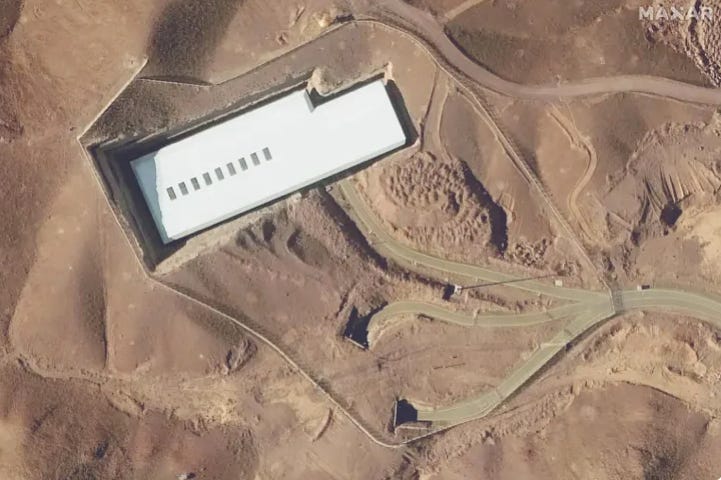Trump Edges Closer to Iran Strike as Pressure Mounts at Home and Abroad
US forces are surging into the region as allies urge restraint and diplomacy.
President Donald Trump is prepared to order US airstrikes on Iran risking a dramatic expansion of the conflict in the Middle East that would put US troops and civilians in harms way.
Without authorization from Congress, it would be an extraordinary act of war taken against another country by a president whose governing style is authoritarian and who has not explained convincingly to the American people why it’s necessary or what comes next.
So far, the president and the White House have been publicly evasive about their plans but have telegraphed intentions through the media. Trump has privately approved military attack plans against Iran but has so far withheld a final order, according to people familiar with high-level discussions who spoke to The Wall Street Journal.
Bloomberg News, also citing anonymous sources, reported that senior US officials were preparing for the possibility of a US strike on Iran in the coming days, perhaps as soon as the weekend.
Asked Tuesday if he had made a decision to strike, Trump responded cryptically: ‘I may do it, I may not do it,’ adding, ‘the next week is going to be very big — maybe less than a week.’
The US buildup of forces in the region, including a second carrier strike group and a third Navy destroyer, suggests the administration is preparing for a possible escalation amid the deepening Iran-Israel conflict.
Overnight Wednesday into Thursday, Iranian missiles struck a hospital and sites in central Israel, wounding 20 people, according to Israeli media reports. Israeli strikes have killed 639 in Iran since the war began. Israel killed more than 140 Palestinians in Gaza on Wednesday.
Iran’s Fordo nuclear enrichment facility, buried half a mile deep under a mountain and believed to be invulnerable to all but the most powerful American ‘bunker-buster’ bombs, is at the center of US military deliberations.
The US has a 30,000-lb bomb in its arsenal called the GBU-57 which theoretically can blast through 60 meters of rock before detonating. Developed for potential use against North Korea’s underground nuclear bunkers and delivered by B2 stealth bombers based in Missouri, the GBU-57 has never been used in warfare.
Trump was told that dropping the GBU-57s would effectively eliminate Fordo but he does not appear to be fully convinced, according to The Guardian newspaper. In a briefing at the White House on 17 June, Trump suggested it would only make sense for the US to launch strikes against Iran if the bunker busters were guaranteed to destroy Fordo, people familiar with the deliberations said.
‘If this war ends and this Fordo is left intact,’ Gary Samore, a former White House official and now professor at Brandeis University, told The New York Times, ‘then it wouldn’t take long’ for Iran to get its program ‘going again.’
Some close Trump allies are pushing for immediate action. ‘Overwhelmingly Americans view the Iran nuclear threat as existential to both the US and Israel,’ Senator Lindsey Graham posted on social media. ‘Go all in. Finish the job,’ Graham said.
Republican political strategist Karl Rove, in a WSJ op-ed, urged Trump to act decisively. ‘Whether it strengthens or weakens his position depends on whether he succeeds in ending the Iranian nuclear threat. He’s been clear that he intends to do so. Now he must decide how, then act. Americans will support him if he does,’ Rove wrote.

Others caution that such a move risks triggering a cascade of violence and escalation. Former US Ambassador Daniel Kurtzer and former National Security Counsel official Steven Simon write in Foreign Affairs magazine that ‘Iran would almost certainly retaliate by killing American civilians.’
‘But if Trump dithers—or, worse, fully joins Israel’s war—he will destroy his ability to broker a more peaceful Middle East, an aim he has repeatedly stressed is precious to him. He must act, and in the right way, before Israel’s appetite for regime change leads to another ‘forever war’—and before the logic of escalation leads Iran to shift from launching missiles to launching terror attacks, including against Americans,’ Kurtzer and Simon argue.
Public and congressional sentiment remains deeply divided. Democrats, including Senator Adam Schiff, have called on Trump to seek congressional authorization before initiating any offensive strikes. ‘Bombing Fordo would be an offensive activity,’ Schiff said on CNN, urging respect for constitutional limits on presidential war powers.

The New York Times editorial board argued the point more forcefully. ‘An unprovoked American attack on Iran would be a war,’ it wrote this week. ‘To declare it is not the decision of Mr. Netanyahu or Mr. Trump. Under the Constitution, Congress alone has that power.’
The Trump administration appears to be pursuing a dual-track strategy. European foreign ministers led by France, Germany, and Britain are scheduled to meet with Iran’s foreign minister in Geneva on 20 June in talks that the US is quietly coordinating. The meetings offer a possible off-ramp if Iran makes credible commitments to limit its nuclear ambitions.
With Iran vowing never to surrender and warning of ‘irreparable consequences’ and counter attacks on US bases in the region, Trump now faces a fateful decision: gamble on diplomacy with Europe’s help, or join in Israel’s conflict that could enmesh the US in another costly and tragic Middle East war.





